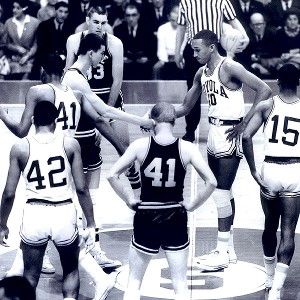“The journey of a thousand miles begins with the first step.” Chinese Proverb
March 1963 – Mississippi State University – Starkville, Mississippi: University President Dr. Dean Colvard stared out his office window. Outside, students marched peacefully, making their position known. His desk was strewn with telegrams and letters from alums and friends. Colvard had a huge decision to make. He knew that doing the right thing could cost him his job, his future and possibly his life.
Colvard grew up in Ashe County, North Carolina. He received his Bachelor of Arts degree from Berea College before earning a Master of Arts from the University of Missouri. In 1950, he received a Ph.D. in science and math from Purdue University. After serving as Dean of Agriculture at North Carolina State, he arrived in Starkville in 1960 as university president.
Meanwhile, Coach Babe McCarthy’s Mississippi State Bulldogs had won the school’s first SEC basketball championship in 1959. More championships followed in 1961 and 1962. Each time, because of an unwritten Mississippi state law that prohibited white teams from playing against teams with black players, the Bulldogs declined the invitation to play in the NCAA basketball tournament. Runner-up Kentucky went in their place each time.
In March 1963, with Mississippi State at 22-6 and one win away from another SEC title, the team once again assumed that a trip to the NCAA tournament was out. This time, however, players met with Colvard to ask why they couldn’t go, students marched in support of the team and the president was bombarded with input from both sides.
To the team’s surprise, on Saturday, March 2, just 15 minutes before the team’s final game against Ole Miss, Colvard boldly stated in a press release, “Unless hindered by competent authority, I shall send our basketball team to NCAA competition.” Colvard had defied Mississippi Governor Ross Barnett and the state legislature. A couple days later, the governor got into the debate. “It is not in the best interest of Mississippi State, the state of Mississippi or either of the races to play in the NCAA tournament,” he stated.
Colvard received angry calls from state legislators. Several accused him of being a “n…. lover.” His security detail was increased because of death threats against him. Assuming the state would not fund the team’s trip to the tournament, Colvard privately arranged for a loan from a Starkville bank.
On March 9, the Mississippi College Board voted 8-3 to allow the Bulldogs to play in the tournament. Two days later, two state senators filed an injunction prohibiting the team from leaving the state. Assuming he was about to be arrested, Colvard met with Athletic Director Wade Walker and Coach McCarthy and hatched a plan.
On Wednesday night, March 13, 1963, Colvard discretely drove to Auburn, Alabama, where he had a speaking engagement. The other two men went to Nashville. Early the next morning, the basketball team slipped out of Starkville and went to the airport. A plane was waiting to take them to East Lansing, Michigan, with a stopover in Nashville to pick up their coach and athletic director. While the aircraft was en route, the Mississippi Supreme Court threw out the injunction against Colvard, Walker and McCarthy.
On March 15, the Mississippi State Bulldogs played Loyola University Chicago before 12,000 fans on the Michigan State University campus. The Ramblers, with a record of 24-2, started four black players in the historic game for the Bulldogs. After leading 41-38 midway through the second half, the Ramblers won 61-51 in a clean, hard-fought game. A week later, Loyola Chicago would become the first team with black starters to win the national championship, beating the University of Cincinnati in overtime in the finals.
Dean Colvard’s courageous decision was a small step in the right direction toward ending segregated college basketball teams and universities in the South. Upon their return to the Starkville airport, a huge crowd celebrated the team that left town in secrecy a few days earlier.
In 1965, Richard Holmes was the first black student admitted to Mississippi State. More than 60 years after the game with Loyola Chicago, the enrollment at Mississippi State is 23 percent African American. Dean Colvard remained at Mississippi State until 1966 when he became the first chancellor of the newly established University of North Carolina – Charlotte.
